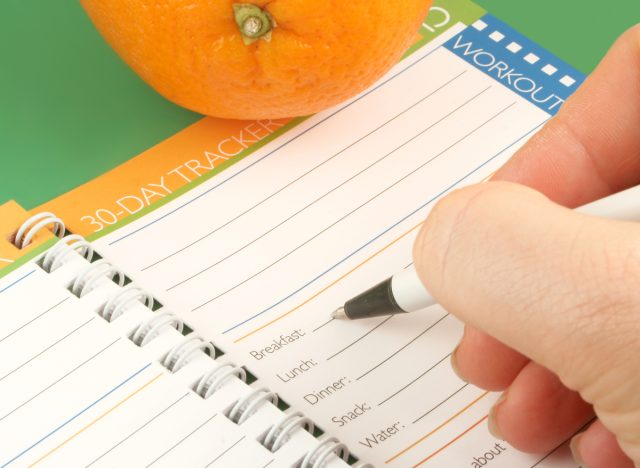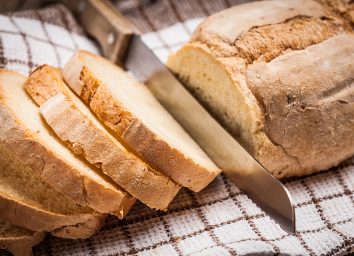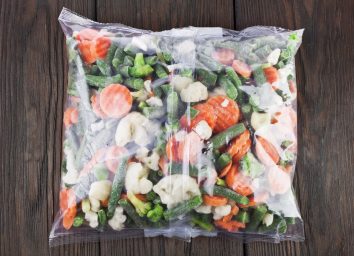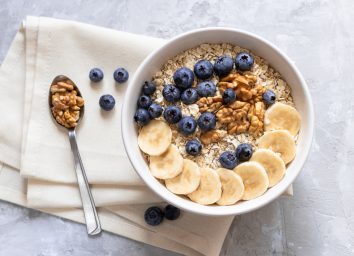The #1 Eating Habit for Maximum Weight Loss, Says Science

If losing weight was an easy task, there wouldn't be an obesity epidemic in the United States. And there is one. More than two out of three American adults are either overweight or have obesity, according to the National Institute of Diabetes and Digestive and Kidney Diseases.
Losing weight is difficult, as anyone who has struggled can attest. It takes significant, long-term effort. And many people find that effort to be a real pain in the ass.
Sometimes, this failure stems from the fact that many people forget the number one eating strategy for maximum weight loss: eating fewer calories than your body needs to maintain its current size and weight.
It may be because the number one way to achieve eating fewer calories is the hardest part of all. It takes keeping track of everything you eat and drink and adding up the calories to make sure you consume less than your body needs to stay exactly as you are. Simply trying to avoid excess calories without the exacting diligence of tracking your consumption rarely works because many of us don't remember exactly what we've eaten and can't accurately gauge how many calories are in those foods.
"We often resort to high-density, nutrient-devoid foods for taste and convenience, which provide a ton of calories that we eat mindlessly and forget about," says registered holistic nutrition Pamela Barton, NNCP (natural nutrition-certified practitioner) and owner of Butterfly Holistic Nutrition. "If we count all those calories we consume during the day, we would see that we most often underestimate how many calories we eat." (Find out the #1 Drink to Avoid Visceral Fat, According to Science.)
To help keep track of those calories, it might be helpful for you to try the best habit for maximum weight loss: keeping a food diary.
How a food diary can help you track calories and maximize weight loss.

Clinical studies have demonstrated that using food diaries to monitor what you eat really improves weight loss outcomes because it trains you to be mindful of what you're eating and provides regular feedback to help you adjust your behavior.
The problem is that many people find the practice annoyingly difficult to do for longer than a few days or they perceive it to be so time-consuming that they never even try, nutrition experts say.
Fortunately, the number one eating habit for weight loss has become much easier to practice thanks to smartphones and food-logging apps that allow you to quickly record meals right after you eat them and automatically analyze nutrition facts.
Using digital food logs can make tracking your food easier.
Researchers at the University of Vermont recognized that keeping a food log is "perceived by participants as onerous and can represent a significant time commitment" and they were curious to learn exactly how much time food tracking took daily for successful weight loss.
In an experiment recently published in the journal Obesity, the researchers instructed 142 participants (average age 48; mostly women) to record their food intake every day for 24 weeks on a website with a self-monitoring diet journal tool. The application provided real-time feedback on the total calories consumed in the day based on the foods and portion sizes. The dieters were given a personal daily calorie goal for a calorie-restricted diet and were encouraged to "write when you bite," that is, log all food right after eating it and check the balance of calories remaining to meet and not exceed their daily goal.
At the end of the six-month trial, the researchers found that very few of the people who failed to track their meals lost weight while those who self-monitored their food intake were much more successful. What's more, those participants who lost 5% to 10% or more of their bodyweight logged in more often, two to three times per day versus entering the day's data in a single computer session. The researchers also found that successful dieters spent an average of 23 minutes per day logging their food during the first month of the trial and just 14.6 minutes per day at month six.
What does this recent study suggest as a takeaway for you? Keeping track of what you eat with one of the many online food logs available is not as difficult and time-consuming as you may think. And it really works if you are consistent.
Takeaway tip:
To give yourself the best chance for success with self-monitoring, the research suggests you log your food right after you eat so you have a better idea of your running balance of calories throughout the day.
While you're keeping track of your food, be proactive about what you eat with these Strategies For A Flatter Stomach at 40, Say Dietitians.
For more healthy eating news, make sure to sign up for our newsletter!
Read these next:








